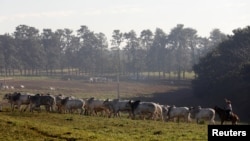Latin American cloud forests, energy-saving street lights in Rio de Janeiro and sustainable cattle ranching in the Amazon will get a boost from new financial instruments to channel capital for tackling climate change, their backers said.
The Lab, a network of programs that incubates sustainable finance mechanisms, expects to attract an initial $855 million to six investment vehicles launched in New York on Wednesday, and is hoping to pull more private capital into its projects.
Barbara Buchner, a climate finance expert who directs The Lab, told the Thomson Reuters Foundation mainstream investors have shown growing interest in climate change projects in the past couple of years.
"The next challenge is to get them beyond the markets they're now comfortable with," she added, citing potential in land use, agriculture and adapting to climate change impacts.
Various partners
The Lab, set up in 2014, raised $822 million for its earlier initiatives, with around half coming from private investors.
It works with governments, philanthropic foundations, development banks and private sector investors, including asset manager BlackRock Inc. and Deutsche Bank.
The latest projects were required to address climate issues in an innovative way, be commercially viable and not be hamstrung by regulatory hurdles, said Buchner.
The instruments to be rolled out by The Lab include the Cloud Forest Blue Energy Mechanism, which aims to restore 60 million hectares of Latin American cloud forest through a scheme that would improve water security and hydropower profits while helping suck carbon from the atmosphere.
And a private equity fund aims to be the first to invest in climate change adaptation technologies for developing countries.
In Brazil, which has suffered a funding shortfall for green action, the Climate Smart Cattle Ranching scheme is seeking to raise $200 million for projects designed to restore damaged grazing land and reduce deforestation in the Amazon, targeting more than 300,000 hectares in the first five years.
Also in Brazil, the Green Receivables Fund (Green FIDC) will provide lower-cost capital to renewable-energy and energy-efficient projects, including a street-lighting scheme in Rio de Janeiro.
Renewable power
Another Brazilian fund plans to cut agricultural energy costs by up to 20 percent by boosting off-grid renewable power.
"Finance is critical to implementing Brazil's goals to increase renewable energy [and] energy efficiency, and move toward sustainable land use," said Jose Antonio Marcondes de Carvalho, a top environment official with Brazil's Ministry of Foreign Affairs.
The new Lab instruments will help Brazil achieve its climate change and sustainable development goals, he added.
Buchner said The Lab was moving beyond a focus on initiatives that directly cut planet-warming emissions.
"There are some really good projects in other areas that can help address some of the sectors where we really need to scale up," if the world is to meet its target to keep global warming within 2 degrees Celsius above pre-industrial times, she said.





